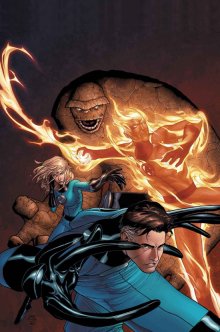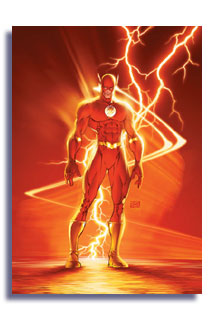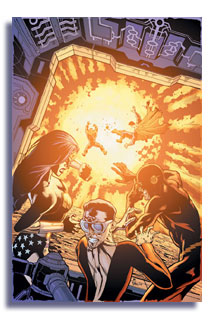|
Hey
Kids! Comics!
4 #2
writer: Roberto Aguirre-Sacasa
artists: Steve McNiven and Mark Morales
This
could be the most advance-hated comic of the year. First,
it was originally intended to replace Mark Waid and Mike Wieringo
on the regular Fantastic Four book. Then it became
infamous as a Bill Jemas-mandated storyline, all the better
to fit in with an as yet non-existent movie pitch. Though
Jemas made some pretty good decisions, when he made a bad
one, it was a doozy that burrowed deep under the skin of fans.
Which
belies the fact that this Marvel Knights effort really isn't
bad. But compared to the regular ongoing Fantastic Four
and the equally good Ultimate Fantastic Four, well,
4 just isn't fantastic.
Aguirre-Sacasa
has bankrupted the Fantastic Four in a sequence of events
that make perfect sense in this liability-skittish society.
(Lee and Kirby did a variation on this in their classic run
as well - but it only lasted an issue.) From heroes to zeroes,
the Richards family struggles to find a new place in New York
City (in more ways than one), as their stock and their standing
has gone kaput.
This
opens up plenty toward exploring their individual personalities.
Too young when he gained his powers, Johnny Storm has no marketable
skill beyond being able to flame on. Arguably the smartest
man in the world, Reed Richards becomes so engrossed in trying
to solve the group's financial situation that he forgets to
actually pay attention to his family.
Only
Sue and Ben actually find a place for themselves. The Invisible
Woman becomes a substitute high school teacher, and The Thing,
naturally enough, goes into construction. But in a nice touch,
he still pretty much gets his hump busted as the new guy on
the site.
Though
a few sharp observations are made, Aguirre-Sacasa surrounds
them in attempts at being clever that keep drawing us out
of the story. Johnny's supermodel girlfriend has dumped him
in favor of Keanu Reeves. Immediately following that, the
writer baldly references Superman: The Movie -- not
in itself a bad thing, but hard to swallow when he's taken
pains to point out that everybody knows who the Fantastic
Four are.
In the
outright weirdest moment, Susan Richards pulls an act of classroom
discipline that in the real world, if it were possible, would
be grounds for a class-action sexual harassment suit. Sorry,
it won't wash.
And yet
Aguirre-Sacasa excels in portraying the relationships among
the four. There's an absolutely great tender moment between
Ben and Johnny, as well as a long over-due confrontation between
Reed and Sue. All of it supported by really sharp work from
McNiven and Morales, who are great at facial expressions.
There hasn't been any real action for them to test their mettle,
but McNiven held his own on Meridian over at CrossGen,
so there's hope.
The problem
lies in comparison, and it's unavoidable. In Ultimate Fantastic
Four, the characters are being brilliantly reimagined.
And in the regular book, they're facing down God, since they've
already met Lee and Kirby. How can this capture our imaginations
when we know it's the leavings of an embarassing moment in
Marvel editorial history?
Rating:

The
Flash #207
writer: Geoff Johns
artists: Howard Porter and Livesay
"A new
race begins!" trumpets the cover. How many times have we seen
that, or something like it, on a cover for this book?
Okay,
so for longtime readers, such a headline probably isn't for
us. No, this cover is one saucy little number meant to lure
in those who just haven't figured out what a regular treat
this book is. Fan favorite artist Michael Turner provides
a full-figure shot of the Scarlet Speedster, and new artists
have taken over the interior. Chances are that was enough
to entice people in who haven't seen this before.
But guys,
the rest of us have.
Some
of The Flash's basic situation has changed, though all of
that happened in previous issues. Now only those who should
have known his secret identity are aware of it, instead of
it being open to the world. For many years, this book has
had the subplot of his love for his wife running through it,
but now she has left to sort things out. And inexplicably
(granted, it's been this way for about eight months), Wally
West suddenly is happiest as a working class joe. Maybe The
Spectre rewired him.
But that's
not what we've seen before. The meat and potatoes of the issue
is another grand get-together of the Rogues Gallery. Throw
in a little conversation between Captain Cold and Doctor Alchemy
to sum up what has gone before with the bad guys, and really,
this book exists almost solely for those new readers. The
old stand-bys hang on, because we know how good it can be.
There are smoother ways, however, to get new readers up to
speed without leaving the fans sitting in the hallway reading
a magazine.
As for
the new artist, Howard Porter has improved from his days on
JLA. Livesay's inking smooths him out a bit. They definitely
have a unique look, and it just hasn't gelled with the feel
of the book yet. But after such a satisfying long run by Scott
Kohlins, it's hard to begin a whole new race. Give it time.
Rating:

JLA
#93
writer: Dennis O'Neil
artist: Tan Eng Huat
It seems
like old times over at the JLA watchtower, even if it's never
happened before. In an interesting experiment, DC paired old-guard
(but still immensely talented) writer O'Neil with up-and-comer
Huat to take a shot at one of the company's more popular books.
The result is somewhat mixed. And by the way, why is the image
of Plastic Man with his head turned all the way around like
that so disturbing?
First,
it's a treat to read O'Neil's characterizations of the team.
In particular, John Stewart comes alive in a way that he hasn't
really been allowed to be since his early days - not coincidentally
written then by Denny O'Neil. It's almost a shock to
see this Green Lantern actually enjoy his powers and handle
things in an easygoing manner. All of the team reads like
we're getting their early seventies incarnations. Simpler,
maybe, than years of continuity and reboots have made them,
but no doubt heroes, each and every one.
With
the possible exception of Plastic Man, a character O'Neil
seems unsure of so he relegates him to the background. It's
clear that he really wants to focus on the big guns left on
the team.
Unfortunately,
a lot of this arc has the same rhythms as an early seventies
story, just more drawn out. If you couldn't figure out what
the strange alien visitor "Peppy" intended to do, you weren't
paying attention. And clearly, neither was the Justice League.
It's also strange that Batman only appears via close-circuit
TV, a touch that vaguely serves to underscore his loner status,
but could just as well have happened so that O'Neil wouldn't
be tempted to use a character he could write in his sleep.
As it is, Batman plays oracle far too conveniently.
The whole
thing also ends on a moralizing note that, while not quite
out of nowhere, rings as falsely as a Superfriends
episode. You can almost hear the cheesy horns swell. Or maybe
it's like a 100-page giant story from …the early seventies.
Perhaps if a different character delivered the denouement,
it would not grate so much. You be the judge; it's not appropriate
to spoil the ending here.
Matching
Huat with the Justice League seems a noble experiment. The
scratchy doughiness of his characters worked really well for
The Doom Patrol, and should recommend him for a guest
shot on Plastic Man someday, just to see. But here
his faces tend to blur into one, even on Wonder Woman. But
he draws a mean Flash effect.
Next
issue, the book moves into the late seventies, reuniting Chris
Claremont and John Byrne, inked by Jerry Ordway. Rumor has
it that a new title will spring out of their run. That's all
well and good, but how about shoring up this one?
Rating:

|








